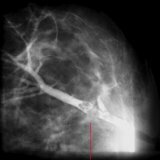Breastfeeding: the composition of milk, the effect of breastfeeding on the baby and mother
 Everyone knows that mother's milk is the most useful food for a baby of the first year of life. Breast milk surprisingly adapted to all the features of digestion and metabolism of the baby, contains the necessary nutrients for it the right amount, in the right proportion and in an easily digestible form. This is very important for a young child whose digestive processes are not yet perfect.
Everyone knows that mother's milk is the most useful food for a baby of the first year of life. Breast milk surprisingly adapted to all the features of digestion and metabolism of the baby, contains the necessary nutrients for it the right amount, in the right proportion and in an easily digestible form. This is very important for a young child whose digestive processes are not yet perfect.
Ingredients of human milk in comparison with cow milk
Scientists around the world, studying the characteristics of breast milk and finding it all the new and new components, do not cease to be surprised at how nature has provided its properties for all components and composition: proteins, fats, carbohydrates, vitamins, minerals.
Breast milk protein consists mainly of whey proteins, that is, albumins and globulins, which are very easily digested and digested. Proteins under the influence of gastric juice form loose thin flakes, which can easily be processed by digestive enzymes, and they, by the way, are not yet active enough for the baby. Rough protein cow's milk, on the contrary, is digested by the child with much greater difficulty.
Breast milk fats are just as easily amenable to digestive juices. In the fat of breast milk contains a large number of polyunsaturated fatty acids, which participate in the structure of cells. They are recognized as the most important constituent of the protein, since they contain amino acids that are necessary for the baby's body and come only with food( in breast milk they are 1.5-2 times larger than in cow's milk fat).Moreover, the digestion and full assimilation of fat of breast milk is facilitated by the special enzyme contained in it - lipase, which breaks down fats.
Carbohydrates of breast milk are ninety per cent represented by milk sugar, that is, lactose, which is advantageously different in composition from lactose from cow's milk. Lactose stimulates the development of beneficial microorganisms, that is, microbes that produce B vitamins, as well as bifidobacteria that inhibit the growth of pathogens.
The total amount of minerals in breast milk is less, however, the mineral composition of human milk is more in line with the needs of the infant. Salts of calcium and phosphorus are in it in an ideal ratio for a newborn ratio of 2 to 1, in cow's milk - 1 to 1. In this case, the salts of calcium and phosphorus are in such compounds that are easily absorbed by the baby's body. Iron in breast milk is almost the same as in cow's milk, but it is absorbed much better - by fifty percent, while from cow's milk - only by ten. Zinc, copper and other micronutrients necessary for the normal development of the child's body, in breast milk contains much more than in cow's milk.
Breast milk is superior to cow's milk by the content of vitamins A, E and D, which are vitally important for a child's body. In this case, the vitamins of breast milk are well absorbed by the imperfect organism of the baby.
Moreover, breast milk contains a free amino acid - taurine, which contributes to the maturation of the central nervous system and the formation of vision.
High biological value of breast milk is also determined by the presence in it of special protective factors, which include living cells leukocytes that destroy harmful microorganisms, as well as a special substance. Nizacin is an enzyme that suppresses the growth of harmful microorganisms. In human milk, many substances that protect the baby from infections.
The composition of human milk is not constant, it depends on the health of the mother, the quality of her nutrition, the conditions of rest and work during pregnancy and lactation.
The volume of basic nutrients in breast milk: proteins, carbohydrates, fats and mineral salts, depends more on the timing of lactation.
Colostrum
In the first three days after childbirth, when the baby is still very weak and can suck more milk from the breast, the mother produces so-called colostrum, which has high nutritional value.
Colostrum is a thick, light liquid that contains a lot of protein. Sometimes the protein concentration reaches seven percent, although the average figure is four percent. Fat in the colostrum is small, which corresponds to the still weak digestive capabilities of the baby. The composition of fat colostrum allows it to be fully absorbed and sufficiently meet the needs of the newborn. The concentration of carbohydrates in the colostrum fluctuates within rather wide limits and depends in many respects on the quality of nutrition of the mother.
Colostrum is also distinguished by a high level of mineral substances, that is, calcium, phosphorus, magnesium and other. Moreover, in colostrum there is a sufficiently high concentration of protective factors. To them we refer various antibodies( lysozyme, immunoglobulin), protecting the intestines of a newborn from infections. It is for this reason that colostrum is referred to the factor that provides the first vaccination. This provides the child with passive immunity, which reliably protects him from the effects of various infectious agents. It is known that infants, who are breast-fed, do not get sick even when they come in contact with infectious patients.
Transitional milk
On the fourth or fifth day of milk production, the composition of the colostrum varies, the mother produces transient milk. It reduces the protein and mineral content, but the fat content is increased, the amount of carbohydrates is also not significantly increased. With time, the volume of produced breast milk increases.
Female milk becomes more permanent in the second to third week after childbirth, the secretion of mature breast milk is established.
Influence of breastfeeding on a child
Scientists claim that children who are breastfed are less likely to have various acute infectious and intestinal diseases, as well as rickets, anemia, they have less allergy. But in children who are on artificial feeding, the probability of these and many other diseases is several times higher. None, even the most expensive modern artificial mixture, will never completely replace breast milk.
We will abolish another advantage of natural feeding: from the mother's breast the baby receives a milk of the right temperature, which is reliably protected from exposure to air and light and free from pathogens. The latter aspect is very important for the prevention of intestinal diseases, especially in the heat and in dysfunctional areas in terms of morbidity.
A child nurtured by mother's milk is advantageously different from an artificial person not only with health and physical development, but also with more profound emotional reactions, he will grow up contact, benevolent, spiritually rich and attached to his parents. Among the former artisans there is a greater number of difficult children, who at maturity are not capable of showing proper parental feelings. Even in the most remote from childhood periods of life, the social adaptation of people who were breastfed and their intellectual abilities is higher than those who were fed by artificial mixtures.
Scientific evidence shows that people who received breast milk as a child are less likely to suffer from allergies, chronic gastrointestinal diseases, diabetes, hypertension, obesity, coronary heart disease, atherosclerosis.
Influence of breastfeeding on mother
Natural feeding positively affects the health of mom.
First, applying the baby to the breast immediately after birth, the mother experiences a reflex spike of a special hormone - oxytocin, which helps to detach the placenta, strengthen uterine contractions and prevent the possibility of postpartum hemorrhage.
Secondly, mothers who breast-fed are less likely to develop malignant tumors of the mammary glands, uterus and ovaries.
There is also evidence that breastfeeding is a fairly reliable physiological factor that prevents subsequent pregnancy during this period.
The very process of feeding a child positively affects the emotional state of both the mother and her baby, a close relationship is created between them, which lasts for many years.
Health to you and your children!



